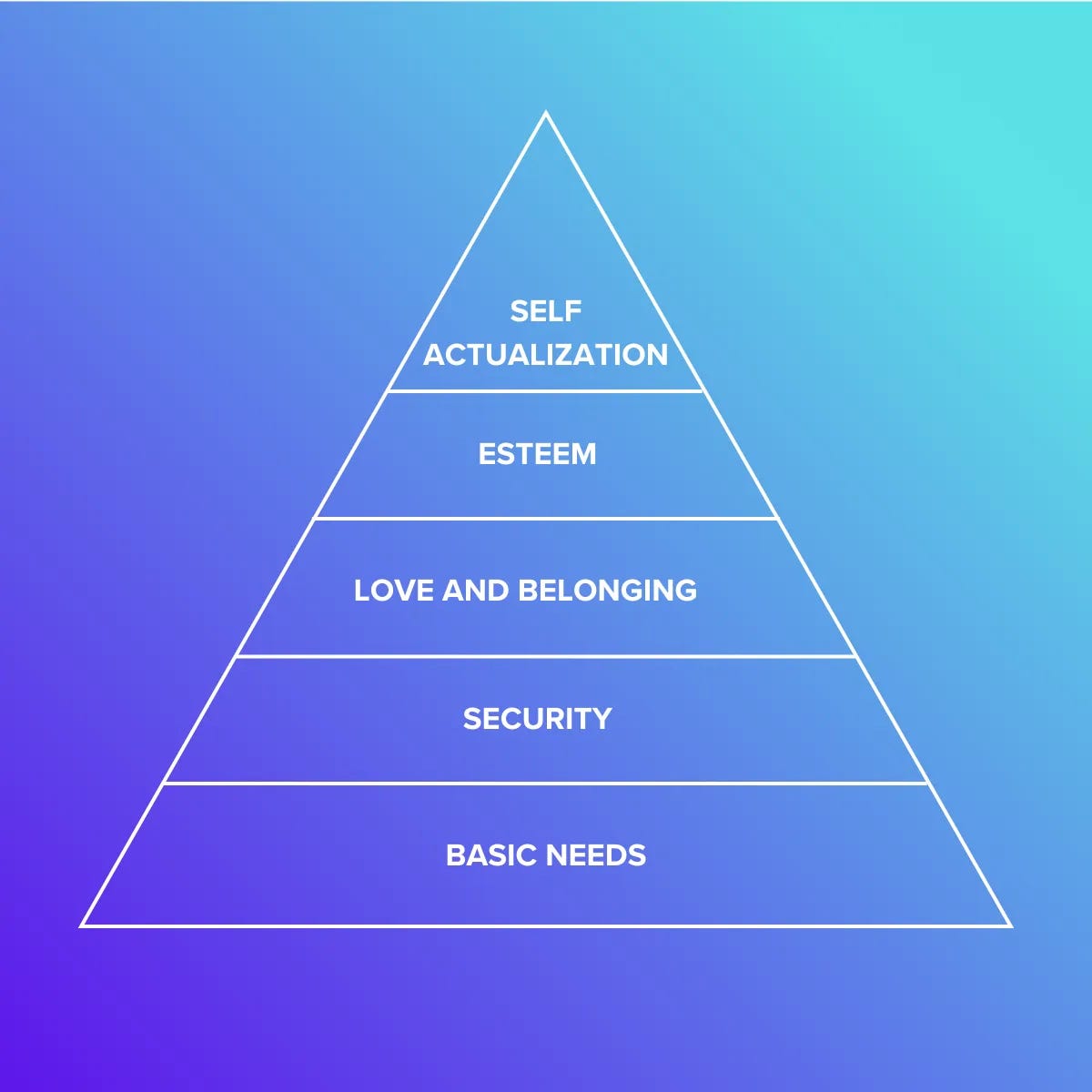Welcome back to my Future Work Series, where I inspire you to explore concepts that may resonate with your situation and encourage you to further build on my ideas:
👉Future Work Strategy #4: Rewriting The Rules of Work
We're in this together, and the time is to develop a new way forward collaboratively. I'd be happy to hear your thoughts in the comments below.
Something extraordinary is happening in the world of work. For the first time in generations, we're witnessing a fundamental shift in how people think about their relationship with employment. It's not just about remote work or four-day weeks – it's about a deeper questioning of work's role in our lives.
The End of the Job Monopoly
In the 1980s, philosopher Frithjof Bergmann warned us about something he called the "job monopoly" – a system where corporations don't just provide our income but act as gatekeepers to our entire hierarchy of needs. Think about Maslow's hierarchy of needs: at the bottom, we have basic physiological needs and safety, which jobs provide through income and benefits. However, corporations have also become the primary source for our higher needs – self-esteem through professional achievement, belonging through workplace relationships, and even self-actualisation through career advancement.
This monopoly over our entire spectrum of human needs is unprecedented in history. We've created a system where a single institution – the corporate job – is expected to fulfil everything from our basic survival needs to our deepest yearnings for meaning and purpose. We've accepted this arrangement for decades, defining ourselves primarily through our paid work and professional identities.
But cracks are appearing in this system, and it's the younger generations leading the charge. They're asking a profound question: Should we entrust our entire hierarchy of needs – from survival to self-actualisation – to corporations whose primary goal is profit?
Born Into Crisis, Built for Change
Millennials and Gen Z have entered adulthood in an era of perpetual crisis. Economic instability, environmental threats, and social upheaval have been constant companions. But rather than breaking under this pressure, these generations are doing something remarkable: they're questioning the very premises of how work should function in our lives.
The traditional promise – work hard, climb the corporate ladder, achieve stability – has proven hollow for many. Internships lead to temporary contracts, which lead to more internships. Job security feels like a relic of the past. But here's the twist: younger workers are creating their own rules instead of desperately trying to fit into this broken system.
The Great Value Shift
What's emerging isn't just a rejection of traditional work structures – it's a fundamental reimagining of what matters. Today's workers are prioritising:
Purpose over paycheck (though they'd like both, thank you very much)
Sustainability over endless growth
Collective wellbeing over individual achievement
Flexibility over corner offices
This isn't just idealism – it's pragmatism born from experience. Why not write new rules When the old ones no longer guarantee success?
Freedom as the New Currency
Bergmann's concept of New Work centred on a radical idea: the freedom to do work that genuinely aligns with one's calling. For some, this might seem like a luxury in an age of economic uncertainty. But to use a beautiful voice previous generations have respectet, too, "Freedom's just another word for nothing left to lose."
The current generation's precarity has become, paradoxically, its strength. Without the golden handcuffs of stable corporate careers, many are free to experiment with new ways of working:
Portfolio careers that acknowledge inner diversity and combine multiple skills to create innovative income streams
Solopreneurs who use technology in clever ways and focus on personal values and sustainable practices rather than endless growth
Value-driven enterprises that prioritise impact alongside profit
Networked collaborations that replace rigid hierarchies with fluid partnerships
Technology as Liberation
What makes this shift possible now when it wasn't before? Technology plays a crucial role. Bergmann's "High-Tech Self-Sufficiency" vision – where small groups could create their own goods and services – seemed utopian in the 1980s. Today, it's becoming a reality.
Digital tools have democratised everything from production to distribution to marketing. A single person with a laptop can run a global business. A small team can compete with corporate giants. Technology isn't just changing how we work – it's changing who gets to be in charge of work.
Beyond Work-Life Balance
Here's where things get interesting. The goal isn't just to work less or differently– to fundamentally reimagine the relationship between work and life. Instead of seeking "balance" between two opposing forces, the new approach integrates work into a broader vision of a well-lived life.
This means:
Recognising that meaningful work can happen outside of paid employment
Valuing contribution as much as compensation
Building careers that flex and evolve with life's seasons
Creating work structures that support human flourishing rather than just economic output
The Road Ahead
This transformation won't be easy. The old systems have deep roots, and change brings resistance. But if we're serious about breaking free from workism's grip, we need concrete action – a systemic change at every level: individual, organisational and structural.
What YOU can do
For individuals, this means more than just seeking work-life balance – it requires a fundamental reset of our relationship with work. Start by questioning whether your job should really be the primary source of meaning in your life. Explore interests outside your professional identity. Engage with your community. Build relationships that have nothing to do with networking. Your resume isn't your biography, and your job title isn't your identity.
What ORGANISATIONS can do
Organisations need to move beyond superficial flexibility policies to fundamentally reimagine workplace culture. This means developing metrics that value human wellbeing alongside profit, embracing truly flexible time structures, and building cultures that recognize employees as complete humans – not just productivity units. It means moving past the lip service of work-life balance to actually restructuring work around life.
What POLITICS can do
But individual and organizational changes aren't enough. We need political leadership that recognizes how deeply our work obsession has warped our society. This means rethinking everything from tax policies that incentivize overwork to social systems that devalue care work. We need new metrics for success that go beyond GDP to measure what really matters: wellbeing, sustainability, and genuine human flourishing.
Most importantly, we need to normalize saying no to workism's endless demands. No to the idea that burning out is a badge of honor. No to defining ourselves primarily through our jobs. No to the notion that productivity is the measure of human worth.
A New Chapter in the Story of Work
What we're witnessing isn't just a generational shift in workplace preferences. It's the beginning of a new chapter in humanity's relationship with work. The job monopoly is breaking down, and in its place, something more human, more sustainable, and ultimately more meaningful is emerging.
The question isn't whether this transformation will happen – it's already underway. The real question is how we'll shape it and what stories we'll tell about work in the decades to come.
Inspired by the work of social philosopher Frithjof Bergmann, Workshift – the recent book of Elly Oldenbourg and the ongoing transformation of work in the 21st century.








> Start by questioning whether your job should really be the primary source of meaning in your life
I really like this! Once you realize that your job doesn't have to be the primary source of meaning in your life, you have two new variables to adjust:
- the primary source of meaning in your life - hobbies? family? friends?
- your job - it's meaning for your life doesn't have to be zero, it shouldn't be! so how does your job paint part of the picture of your life without becoming the dominant blob of hot pink in the middle of the canvas?
I believe the main approach that could work for the majority of people is this: a corporate job (either full-time or part-time) combined with your own portfolio of services.
Let’s be honest, not everyone is suited to handle the burden and pressure of being a solopreneur or running an enterprise.
This approach can serve as a valuable step, allowing you to gain experience and confidence before transitioning to something more independent, if that’s your goal.